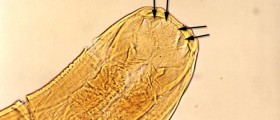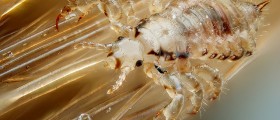
Human body is a host for vast number of parasites as well as worms, bacteria, viruses, fungi and mites. Over 1,000 types of parasites can live in a human body, causing serious health problems. Infestation by parasites has become epidemic in some regions of the world. Large percent of population in North America also suffer from parasitic infestation. However, health care providers often do not consider parasites as the cause of symptoms like: chronic fatigue, skin rah, weak immune system, colitis, water retention, joint and muscle pain, poor memory, allergies to certain foods and others.
Types of Parasites in Human Body
Parasites are organisms that require other organisms, or hosts, in order to survive. A host provides shelter and food for parasites. This way parasites gain all the benefit while the host can suffer from different diseases, infections and symptoms due to parasitic attack. For example, a hookworm called Necator Americanus, which means American Murderer can cause an iron deficiency anemia in humans because it hooks itself into the intestinal wall where it drinks blood and sucks tissue.
Tapeworms are the type of parasites that take all the nutrients from the host causing him or her to fell constantly hungry. Tapeworms can grow over 30 feet long and lay over a million eggs per day. Tapeworms can also cause water retention in a host.
Pinworms infestation is quite common. These intestinal parasites easily attack humans since their eggs are usually airborne. The most common symptom of pinworms is itching in the rectal area.
On the other hand, some parasites are not so dangerous to human health. For example, tooth amoeba that lives in our oral orifice is actually doing us a service because it thrives on food particles that may have left after tooth brushing. Also, dust mites can cause allergies in some people but at the same time they do us a favor since they feed on our dead skin cells. An eyebrow mite is a type of parasite that lives in human hair and does not cause any serious health problems although it can be responsible for hair loss.
Prevention of Parasitic Infestation Scientists claim that more than 85% of population worldwide are affected by parasites. Since they easily reproduce, it can be hard to eliminate parasites, and it also requires time. First of all, it is important to boost the immune system to prevent the infestation. Appropriate diet is also the significant part of the prevention. Sugar, saturated fat, processed food, white flour, yeast, alcohol, tobacco and caffeine should be avoided as well as improperly cooked meat. Also, drink only pure water and maintain good hygiene. Finally, you can find many useful tips on the internet and in different books on this subject.

















Your thoughts on this
Loading...